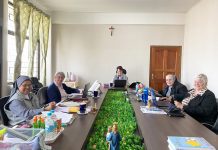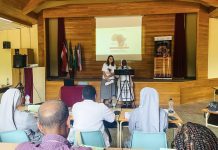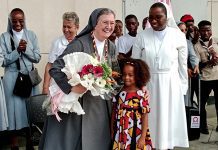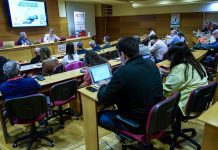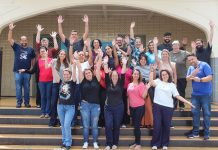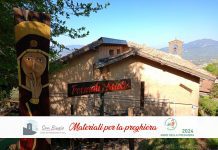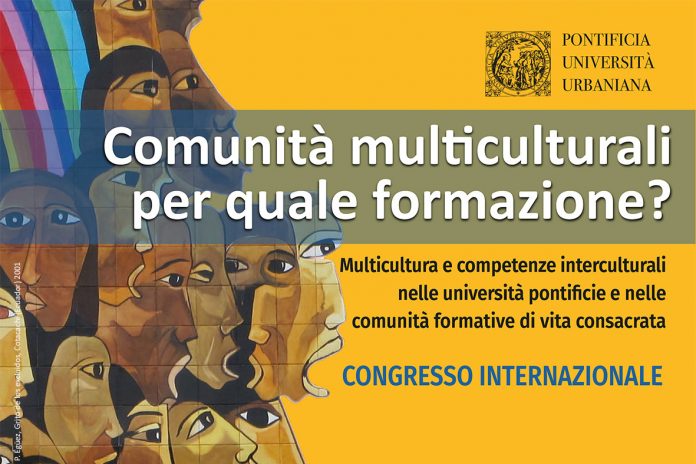Rome (Italy). From 17 to 19 November 2021, at the Pontifical Urbaniana University of Rome, the annual Congress was held on the theme “Multiculture and intercultural skills in Pontifical Universities and in the Formation Communities of Consecrated Life”.
The Congress aimed to offer an analysis and reflection on religious formation contexts, Communities, Pontifical Universities, Catholic Formation Institutes, and Centers for Formation in Consecrated Life for men and women characterized by multiculturalism, both of formators and formandees, of teachers, and students.
A note sent by the Urbaniana University to Fides Agency highlights the educational challenges posed by the issue, “If multiculturalism is a fact of our plural society and in particular of the educational environments of the Catholic Church, intercultural, reciprocal exchange, and mutual transformation are still a horizon looked at with curiosity or concern, an educational challenge that primarily concerns formators and therefore formandees.” Intercultural and interdisciplinary skills are then, “the future of the global educational pact, in view of the participatory construction of the integral person and of a society of sisters and brothers”.
In the course of the Congress, in presence and in direct-streaming on the YouTube Channel of the PF Urbaniana, according to a rich and articulated program with interventions in plenary and parallel sessions, the main issues surrounding the multiculturalism of students and teachers and the impact on the contents and formation models offered in formation for consecrated life and in Pontifical Universities were addressed.
On 17 November, scholars from different geographical contexts discussed the epistemological transformations that are produced and could be created in the multicultural contexts of contemporary societies, in relation to three disciplinary areas: philosophy, theology, and the human sciences.
The day of 18 November was dedicated to the presentation of the results of the Research-Action-Formation entitled “Multiculturalism and formation in pontifical universities and in formation for consecrated life”, co-promoted by the Higher Institute of Catechesis and Missionary Spirituality (ISCSM) of the Pontifical Urbaniana University and the International Union of Superiors General (UISG), in collaboration with the Pontifical Faculty of Educational Sciences “Auxilium”.
Research director is Prof. Luca Pandolfi, full professor of Cultural Anthropology at the Pontifical Urbaniana University, the co-director is Prof. Enrica Ottone, extraordinary docent of Social and Intercultural Pedagogy at the «Auxilium» Faculty.
The research, planned towards the end of 2017, was launched in 2018 and ended in 2021. It has reached more than a thousand people including teachers and students of some Pontifical Universities and Institutions of Higher Studies, and members of the Formation Communities of female and male Consecrated Life. Individual and group interviews were conducted, including 65 focus groups, and a questionnaire (survey) translated into 9 languages was administered, in addition to the use of other qualitative survey tools.
The research team that dealt with the analysis of the large amount of data collected was made up of Luca Pandolfi and Enrica Ottone, supported by three experts: Fiorenza Deriu, (Department of Statistical Sciences of the La Sapienza University of Rome), Nina Deliu (Postdoctoral Researcher at MRC – Biostatistics Unit, University of Cambridge (UK), Luca Di Censi (Scientific advisor “Human Foundation”, Rome).
In conducting the focus groups, the research saw the involvement of Prof. Martha Séïde, lecturer in Theology of Education at the “Auxilium” Faculty and four young Past Pupils graduates of the Faculty, with the participation of educators and students of the same Faculty of focus groups and surveys.
Professor Ottone in her presentation, explained the methodology and the results of the research conducted on a group of university students, mainly from the “Auxilium” Faculty, based on stories of ‘challenging’ events in the intercultural context they experienced, in which skills are put in place to live interculture that can be seen as an articulated system of human, relational, basic skills that set in motion the cognitive, affective, and emotional resources of the person.
Some challenges that emerged from the research, for the university and CL Formation Communities, are the importance of promoting reflection and awareness on the urgency of developing basic and specific skills to experience interculture from a lifelong learning perspective; to provide critical skills to interpret their own and others’ culture; to recognize and manage emotions and prejudices; to use spaces, create opportunities, devote time to formal, non-formal, and informal activities to encourage sharing and interaction.
On November 19, the final day of the Congress, through the interventions and the debate in the hall, further challenges were gathered to bring interculture into the daily life of study and mission, through the identification of formation journeys.
Source: pfse-auxilium.org
“Diversity is always a little frightening because it jeopardizes the acquired security and provokes the stability achieved. … Faced with cultural, ethnic, political, and religious diversities, we can have two attitudes: close ourselves in a rigid defense of our so-called identity or open ourselves to the encounter with the other and cultivate together the dream of a fraternal society”.
(Pope Francis during his Apostolic Journey to Budapest, 12 September 2021)



